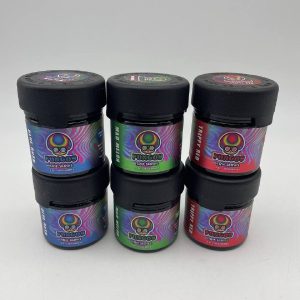Almond Joint – 1000mg THC Infused
$11.00 – $4,000.00
Price:
- $10.00 (100)
- $9.00 (250)
- $8.00 (500)
- Ask for pricing on 1000+
How long does cannabis edibles stay in your system
The duration that cannabis edibles stay in your system can vary depending on several factors, including the individual’s metabolism, frequency and amount of use, the potency of the edibles, and other factors. Here’s a general timeline for how long cannabis edibles may be detectable in your system:
- Onset of Effects: After consuming cannabis edibles, the effects typically start to be felt within 30 minutes to two hours, but it can take longer for the full effects to manifest. This delayed onset is due to the digestion and absorption of cannabinoids through the digestive system.
- Duration of Effects: The effects of cannabis edibles can last significantly longer compared to inhalation methods. The psychoactive effects may last for several hours, typically four to six hours or more, depending on the potency and dosage consumed.
- Detectability in Urine: THC and its metabolites can be detectable in urine for an extended period after consuming cannabis edibles. In regular users, THC metabolites can be detected for up to 30 days or more, but for infrequent or one-time users, it’s more common for THC metabolites to be detectable for a few days to a week.
- Detectability in Blood: THC levels in the blood peak shortly after consuming cannabis edibles and then gradually decline over time. THC is typically detectable in blood for a shorter duration compared to urine. For infrequent users, THC may be detectable in blood for up to 24 hours, while for regular users, it can be detectable for a few days.
- Detectability in Saliva: THC can be detected in saliva for a shorter duration compared to urine or blood. It is generally detectable within a few hours to one or two days after consuming cannabis edibles, but the exact timeframe can vary.
- Detectability in Hair: THC and its metabolites can potentially be detected in hair for an extended period, even months after use. However, hair tests are less common and are typically not used for short-term detection.
It’s important to note that these are general guidelines, and individual factors can influence the duration of detectability. Additionally, different drug tests have varying sensitivity levels and detection windows, so it’s challenging to provide an exact timeframe for detection.
If you have concerns about drug testing or legal implications, it’s advisable to consult with a healthcare professional or legal expert who can provide guidance based on your specific circumstances and jurisdiction.
| Quantity | Single, 100, 250, 500 |
|---|
Be the first to review “Almond Joint – 1000mg THC Infused” Cancel reply
Related products
Edibles
Edibles
Edibles
Edibles
Edibles
Edibles
Edibles
Edibles













Reviews
There are no reviews yet.